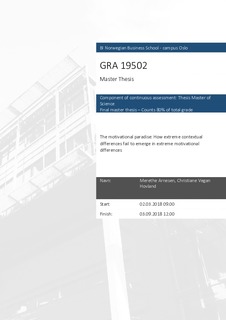The motivational paradise: How extreme contextual differences fail to emerge in extreme motivational differences
Master thesis
Permanent lenke
http://hdl.handle.net/11250/2579728Utgivelsesdato
2018Metadata
Vis full innførselSamlinger
- Master of Science [1621]
Sammendrag
This master thesis investigates the accuracy and precision of survey-based
instruments. We will present previous research by highlighting the limitations of
survey-based research with a five-point Likert scale and the problems with
interpreting such results. To investigate these relations, we have chosen to use
motivational theory and the Job Characteristics Model as a case.
Our study has a cross-sectional research design and we have chosen an
explorative approach in light of measurement theory. Our sample is divided in
three; the first sample was a self-rating sample (N= 399), which consists of
participants within 18 different occupations or work contexts. These participants
were recruited to conduct a motivational survey. The second sample was an
external evaluation panel (N= 30), which conducted a survey rating of the work
contexts on several job characteristics. Our third sample (N=27) participated in indepth
interviews to complement the quantitative information. The majority of
these participants were also a part of the self-rating sample.
The 18 occupations were selected to reflect an undisputably broad range of
situations that should elicit different types of motivation such as intrinsic and
extrinsic motivation. Since the different work contexts presumptively seem to be
extremely different, one would assume that the motivational configuration should
be quite different. However, according to our findings, the differences between
the motivational configurations for the occupations were small. Our results
indicate that the differences in measurements of motivation are minimal between
the 18 occupations. From the results it is therefore difficult to distinguish between
the motivational state for a priest or a sex seller. Because of this, one might argue
that what is measured is not necessarily what we believe is measured.
Consequently, one may argue that there is a need to consider qualitative data in
order to understand and interpret quantitative data.
Beskrivelse
Masteroppgave(MSc) in Master of Science in Leadership and Organizational Psychology - Handelshøyskolen BI, 2018
